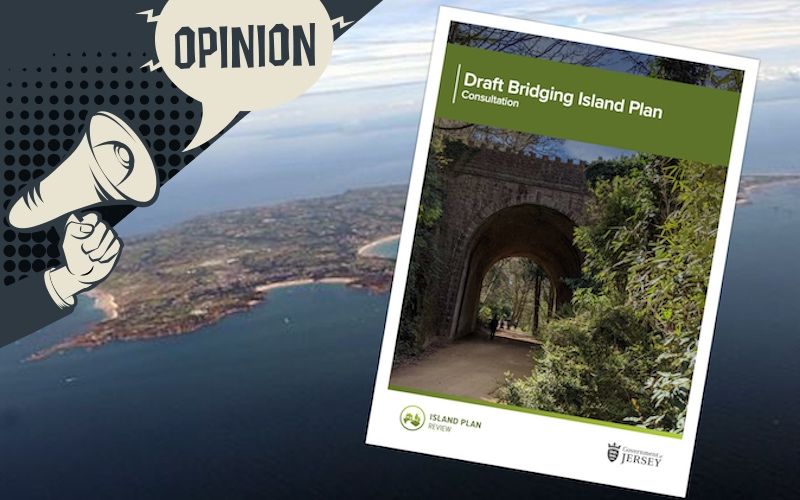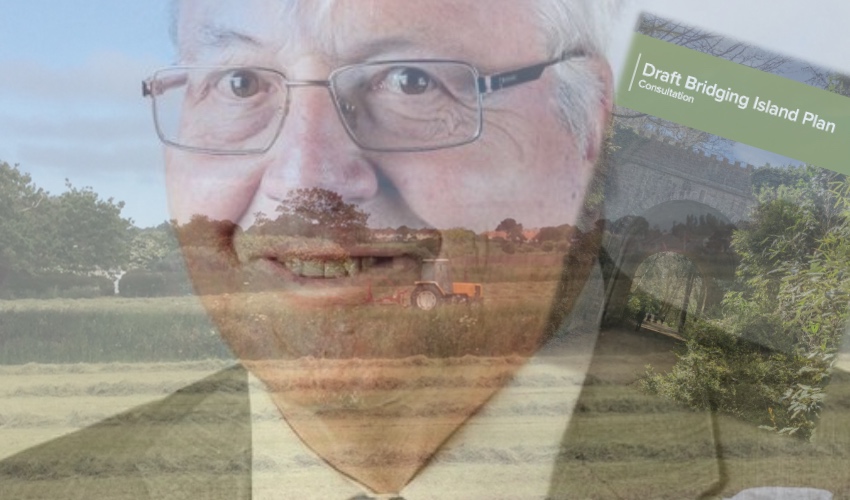


The Minister for the Environment has declared the Bridging Island Plan to be "the start of a great future for Jersey". Packed with proposals to protect the scenic beauty of some areas of the island, local farmers have described the draft as "an objector’s charter" and a "land grab".
He also has described Island Plan approval as "the most rigorous, open and democratic process of all corporate policy tools developed by the Government of Jersey".
So why does it seem like an elaborate and expensive smokescreen, to justify pushing through planning policies created in a silo, at a time when the future already is murky?

"... why does [the Island Plan] seem like an elaborate and expensive smokescreen, to justify pushing through planning policies created in a silo, at a time when the future already is murky?"
The Minister has said he ‘is entirely satisfied’ with the process and that ‘anyone with any interest in the matter will have had an opportunity to participate, both directly and indirectly, and will have had opportunity to have their views heard and considered.’
But having an interest in the matter is not enough.
The Island’s Plan’s conflicting and somewhat vague policies are designed to allow planners ‘flexibility’ in approving development, so what’s the point of arguing for clarity and certainty? Decisions made behind closed doors create fears that the process can be abused. If States Members on the Planning Committee openly reject a planning officer’s recommendation, a planning inspector on appeal can easily find arguments that support its approval.
Professional planning consultants, paid by the hour, might relish trawling through the Bridging Island’s Plan’s 365 pages and then turning to a larger amount of literature on which government’s policy makers claim the draft is based. The people most likely to afford planning consultants are developers.
You may jest planning is a law to itself, designed to confuse the layman. That would insult legal content and process. Law draftsmen seek to be concise, to define terms and to avoid ambiguity. There is more purple prose in the draft explaining policy rather than statements of policy itself. Supporting ‘evidence’ either is compiled by government or by consultants employed and briefed by government (all at the public’s expense).
Government has thrown some of its evidence out of court without explaining why. The Plan compensates for one type of land grab by allowing increased development in other areas. The need is based on guesstimates. There is no guarantee housing affordable by the less wealthy will be built. Anyone thinking the construction industry will blossom after offering the wealthy more sites to build in should consider where workmen will wish to live.
Planning creates jobs for planning consultants, at least, some of whom are former government planners. The Plan has gaping holes in content and contains proposals to fill them, creating more work for policy officers too. The bridge in the Bridging Island Plan may span the Firth of Forth. Or could the same proposals be no more than can-kicking gloss?

Pictured: "Recommendations from paid consultants to restrict housing development in parts of St. Brelade's Bay also have been ignored."
A public consultation found a preference for further housing development to be centred in and around St. Helier. And the Planning Officers Society in 2013 recommended that more was done for States members to take ownership of the Island Plan. Yet both the Constables of St. Helier and St. Brelade have protested at a proposal to explore designating Quennevais as a ‘secondary urban centre’. Recommendations from paid consultants to restrict housing development in parts of St. Brelade’s Bay also have been ignored.
The Minister and a lead policy officer have had long careers in government planning. Could anyone praising the process be marking their own homework?
Hats off to any valiant member of the public who has tried to participate in a public engagement workshop (the Minister’s officers control the invitee list and decide what question should be asked). How satisfied were the public with the public consultation, not having been consulted about the questions policy officers chose to ask?
The public consultation ended on the same day as the deadline for States Members to submit amendments to the draft plan. How can they be democratically representative if unaware of the outcome of the unpublished ‘public’ consultation? Already burdened with the intricate waffle in the Government Plan, how many States Members are advised by independent planning consultants?
Independent planning inspectors conduct a series of hearings to consider areas they consider contentious. Their ‘Examination in Public’ isn’t a trial by ordeal at least, but it certainly has elements of ordeal, with limited word counts and limited time slots to make further submissions in reply to the Minister’s responses to the first round of objections.
Some objectors have pointed out cracks in the process, questioning the soundness of its structure. One ‘examining’ independent planning inspector declared it isn’t within his remit to investigate how government conducts its work.
Two stated Island Plan strategic objectives are to preserve the ‘sense of place’ of areas in the island and ‘community participation’. In this respect, the Minister might have been better advised to ditch the whole Island Plan process and look to the use of Codes, as in the Continent, with (independently advised) elected Parish representatives contributing to the drafting.
A Code would deprive planners of flexibility but would provide consistency and relative clarity. That, and a published administrative law framework regarding how decisions should be made, would make legal intervention easier. Proceeding with the establishment of a Public Services Ombudsman (recommended by the Comptroller and Auditor General and approved by the States Assembly) would help the public and States Members own the Plan too.
But who will advise the next Minister for the Environment this is the way forward? An undemocratic self-licking lollipop could be more to the taste of the island’s policymakers and planners.